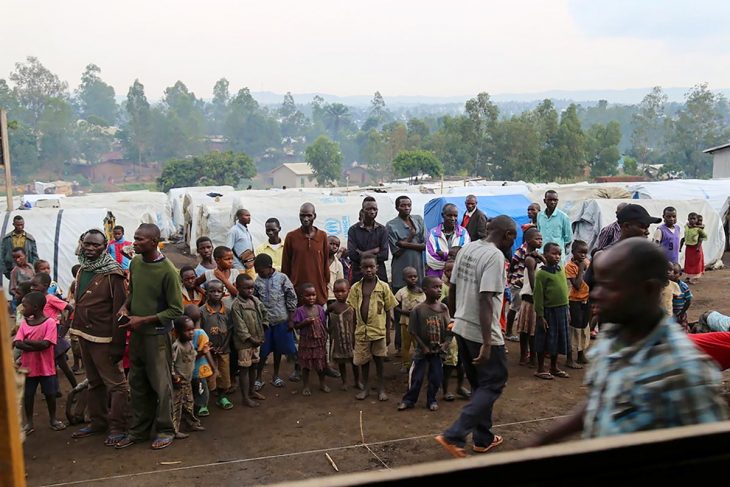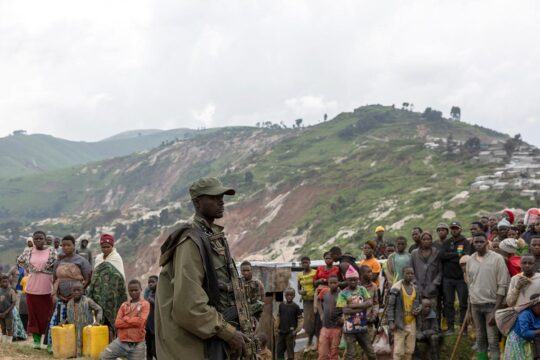After years of relative calm, violence resumed at the end of 2017 in Ituri, a region in the northeast of the Democratic Republic of Congo (DRC). It peaked towards the end of 2019. According to a report published on January 10 by the UN Joint Human Rights Office (UNJHRO), the attacks could constitute genocide.
Most of the victims seem to have been targeted because they belong to the Hema community, says the 30-page report (at least 701 people killed, 168 injured and at least 142 subjected to acts of sexual violence between December 2017 and September 2019).
The violence could contain at least some of the elements of genocide, it says, given the apparent targeting of the Hema community, the high number of civilians killed and subjected to sexual violence, the willingness during attacks to kill the wounded, the attacks on IDP camps and systematic destruction of Hema homes. But the UN report says investigations carried out to date “have not sufficiently established the intent to destroy the Hema as an ethnic group”.
The UN has less hesitation in pointing to crimes against humanity, saying its investigations have found that the human rights violations and attacks documented in the report took place in the context of widespread and systematic attacks on civilians, especially the Hema. “Killings, rapes and other forms of violence targeting the Hema community in the Democratic Republic of Congo province of Ituri may amount to crimes against humanity,” says the report.
Some acts could also constitute war crimes, since they took place “in the context of an internal armed conflict”.
An extermination plan?
The Hema community immediately used the UN report to demand justice. "There are crimes against humanity, war crimes and crimes of genocide. There is one community that is being targeted, the Hema people. This is a plan that has long been developed by Lendu extremists. The report of the Joint Office clarifies things, by qualifying the facts," Vicky Ngona, spokesperson for the Hema community, told Justice Info.
Congolese researcher and activist Marcel Héritier Kapitene admits the report has the merit of "challenging the human conscience" on the situation in Ituri. But he does not think a genocide is under way. "This analysis presents the Hema as protégés of the international community in a Congo where crimes are being committed everywhere. It gives the impression that the UN only looks at one community and forgets the others who are victims of crimes in neighbouring North Kivu, South Kivu, Kasai, even Katanga," he explains. "To talk about genocide is to say that there is one community that wants to exterminate another. It is difficult today to prove the existence of a plan to exterminate the Hema."
Xavier Macky, coordinator of Ituri-based human rights NGO Justice Plus, has a similar view. "We welcome the report because it draws the world's attention to the crimes being committed against civilians in Ituri,” he says. “We are pleased because it already sets the stage for an independent international investigation that we have long wanted." In his view, the report is "a strong signal from the UN that crimes must not go unpunished”.
But he too is cautious when it comes to classifying the crimes: "I think it is premature to talk of a possible genocide, because it is still difficult to prove the intent to destroy an ethnic group in whole or in part.”
Land conflict or ethnic conflict?
Most people also reject the UN’s analysis on whether this is a conflict over land. Vicky Ngona rejects the idea. "Take a plane and fly over the Ituri region, and you will see that there is no shortage of land,” she says. “There are empty spaces that can accommodate other communities. What is happening here is the execution of a plan to exterminate a people. We need to punish all the perpetrators, even intellectuals, of these crimes." The Hema representative accuses the Congolese state of having failed in its duty. "If we are victims of all this, it is because we are in an irresponsible state, which does not know how to ensure the protection of its people. And it is the state we ask to explain why we are victims of these attacks. The Congolese state must not sanction impunity."
Marcel Héritier Kapitene agrees. "It is not a problem of land because there is no serious lack of land in Ituri," he says. Xavier Macky thinks the same. "It's not a land problem. It is rather an ethnic identity crisis that dates back to the colonial era. And it is at that level that I find the UN report a bit incoherent," he says. He believes that the current violence is the result of an inadequate response, in terms of justice, to the conflict that tore Ituri apart in the early 2000s. "What is happening now is a logical continuation of the former Ituri conflict,” he told Justice Info. “That conflict was badly managed. The authorities seemed to focus on the judicial aspect and to sacrifice other pillars of transitional justice. While some alleged perpetrators have been brought to justice, the work of reconciliation and reparation has been neglected. The Truth and Reconciliation Commission set up at the end of the inter-Congolese dialogue has not worked, even though it was also supposed to take into account the Ituri case. In short, people have never had the opportunity to expose the truth, for a possible reconciliation. It is a fragile context, conducive to the resumption of conflict."
He urges judicial and political authorities in the DRC to work together to resolve the conflict in Ituri. "As well as prosecutions, there is a huge amount of truth and reconciliation work to be done. We need to complete the transitional justice process, because people have suffered enormous harm. We also need to achieve reparation. This is the way to lasting peace in the Ituri region.”
Lendu response
The Lendu community, which has been implicated in the abuses against the Hema, made a point of reacting at a press conference on January 20. In a statement, Lendu representative Célestin Tawara Angaika denied there was an inter-ethnic conflict in Ituri. He said saying there were only disputes between neighbouring villages, which could not be described as intercommunal conflict, let alone genocide. He claims the UN has chosen to ignore the damage inflicted on the Lendu by the Hema and the army. "The report forgets the proven responsibility of members of the Hema community who have allied themselves with the Congolese armed forces, serving as scouts, guides and target identifiers in the Lendu areas. These joint Hema-army operations against the Lendu civilian population have created a climate of mistrust between the Congolese armed forces and the Lendu population."
He says this is dangerous, and also denies that the Lendu are in search of land. "The Lendu have enough ancestral land,” he argues, denouncing allegations of genocide that “some individuals want to use against others”.






